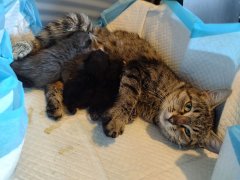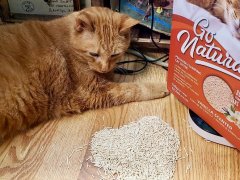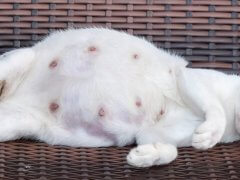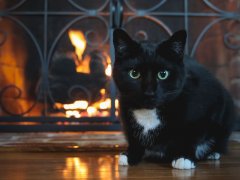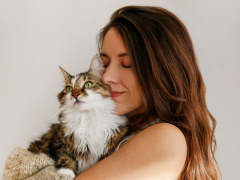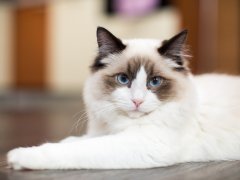
Liz Coleman / Cats.com
It’s a fascinating sight, watching cats lap quickly and efficiently at their water with those little pink tongues. Cats are an example of an obligate carnivore, deriving the nutrients they need from a diet mostly made up of animal protein.
Wild cats would also gain most of their hydration needs from their diet, but will supplement this with fresh water.
Cats can be fussy about their water: the type of water bowl, the placement of bowls near food, litter box or shadows, whether the water is tap water or filtered… it’s easy to become concerned that your precious kitty isn’t drinking enough and try to encourage them using something else.
But what is safe to drink, and when should you offer it? Read on to find out what cats can drink, why you shouldn’t offer them milk, and how you can encourage healthy hydration.
What Can Our Cats Drink?
Cats are descended from their desert-dwelling ancestors, and are very good at extracting water from their diets. However, especially with many domestic pet cats now fed dry food, they do need access to liquid. Water is by far the best option in terms of health benefits, but there are a few safe options for cat beverages.
Let’s look at the choices.
1. Clean, Fresh Water

Even if your cat does seem to prefer muddy puddles or a stagnant pond, they should always have clean, fresh water available. Liz Coleman / Cats.com
Even if your cat does seem to prefer muddy puddles or a stagnant pond, they should always have clean, fresh water available. Water is the only liquid that cats really need. Wild cat populations, including our domestic cats’ big cat cousins, will only drink water, and have survived that way for thousands of years.
A cat’s water should be clean, accessible and always kept freshly topped up. For adult cats, there is no need to provide anything else.
2. Kitten Milk
A kitten will usually suckle their mother’s milk from birth until weaning. From about four weeks of age, they will start eating some solid food, and are usually fully weaned by about 8 weeks, by which time they should be eating a balanced kitten diet and drinking solely water.
Orphaned or rejected kittens will need to be fed with a kitten milk replacement (KMR). Kitten formula is high in calories, rich in fats and proteins and contains the nutrients, minerals and vitamins needed for growth and development.
3. Cat Milk
A young kitten will possess the lactase enzyme, allowing them to digest milk, but this is usually lost by the time they are a few months old, with most adult cats unable to digest lactose. This is why cow’s milk should not be given to cats, as in a large percentage of cats it will cause an upset stomach due to their lactose intolerance.
There is ‘cat milk’ available to buy, which contains no lactose. This is safe for adult cats to drink, but it is often very fatty and high in calories to make it palatable.
This means that cats certainly enjoy it, but it can lead to weight gain and some cats will stop eating their balanced meal if they drink too much of it, leading to nutritional inadequacies. If your cat loves cat milk, it is recommended to give it as an occasional treat only.
4. Broth
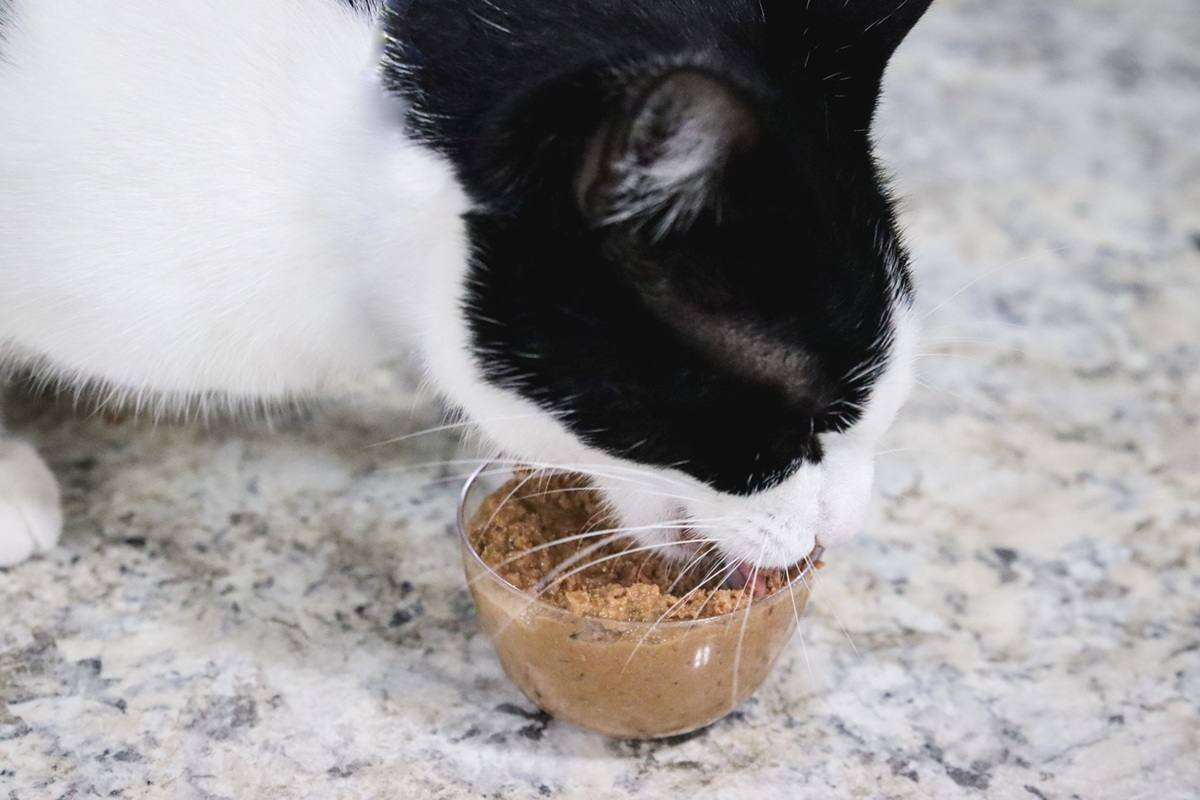
Kirsten McCarthy / Cats.com
As an obligate carnivore, it is likely that your cat will love meaty flavors. Bone broth can be made by boiling up the bones and gristle of a meat joint such as a chicken, over a long period of time.
Alternatively, meat broths such as beef or chicken broth can be made by boiling fish or meat and then giving the cooking water to your cat once cooled. Again, these can be used as an occasional treat, or just add a little to your cat’s water dish to add some flavor if they are a poor or stubborn drinker.
Home-made broths are better than store-bought, as you should avoid high levels of salt, and home-made broths tend to have a low sodium content compared to commercial stock. It is also important to avoid the use of garlic or onions when making broth, as these are both toxic to cats.
5. Tuna Juice
Cats are highly attracted to meaty, fishy odors, and have a wonderful sense of smell. If you open a can of tuna, it is likely that your cat will come running if they catch the scent! If you buy tuna canned in water, the juice is safe to give to your cat as a tasty treat.
Don’t do this if you purchase tuna in oil or brine as these can both cause stomach upsets in cats, and brine has a high sodium content. Tuna shouldn’t be fed to cats too often due to the mercury content, but is fine given sporadically.
6. Oral Rehydration Fluids
If your cat has been suffering from an illness, such as vomiting or diarrhea, and you are concerned about their hydration, a check-up at the vet is always a good idea. They may be able to provide an oral electrolyte solution that can help keep your cat hydrated and on the road to recovery.
How Much Should My Cat Drink?

How much your cat should drink varies based on diet, age, size, health, and environment—cats on dry food need much more water than those on wet food.Liz Coleman / Cats.com
It is very difficult to give a specific answer in terms of ounces of water, as a cat’s water intake will depend on their age, size, climate environment, diet and any health conditions. Cats on a dry food will need to drink significantly more than a cat on a wet food, who may be only seen to drink water rarely.
If your cat suddenly changes their drinking habits, seek veterinary advice. Increased thirst can be seen with various health problems including kidney disease, diabetes and hyperthyroidism in cats.
What Should Cats Not Drink?
The safest and healthiest option for cats to drink is plain, clean water. However, there are certain drinks that should never be offered to cats, as they may pose certain health risks, some more serious than others.
1. Milk
Many adult cats are lactose intolerant, meaning that cow’s milk and other dairy products can cause stomach upsets with sometimes quite violent vomiting and diarrhea and so is best avoided. Even if your cat can tolerate it, milk is fatty and calorific and therefore could lead to obesity if given too much.
Goat’s milk is potentially less problematic, but there is no benefit to giving it. Alternative plant milks such as oat milk and nut milks should also never be given, as some ingredients used in these are toxic to cats.
2. Juice
Some fruit juices are technically safe for cats in small quantities, but their high sugar content and calories make the unsuitable. Some fruits are toxic to cats, and so fruit juice and other sugary drinks are likely best avoided.
3. Alcohol
An alcoholic beverage should never be given to cats, even one with a low alcohol content, due to the high risk of alcohol poisoning and harm to their liver health.
4. Caffeine
Caffeinated beverages can stimulate cats as they do people. Cats are much smaller than people, and even small amounts of caffeine can cause heart palpitations and seizures.
How Can I Get My Cat To Drink More?

Use wide bowls for water, so that your cat’s whiskers do not constantly brush against the sides as they try to drink. Kate Barrington / Cats.com
Cats are usually very good at regulating their own fluid intake, and so as long as fresh water is provided for them, they will usually monitor themselves unless they have a health condition. If you are concerned about your cat’s fluid intake, here are some top tips.
- Use wide bowls for water, so that your cat’s whiskers do not constantly brush against the sides as they try to drink.
- Place water bowls away from food bowls and litter trays – cats instinctively like to drink from water away from any possible contamination to reduce the chance of disease.
- Use a ceramic, glass or metal bowl that can be easily cleaned. Plastic bowls can leach tiny particles into the water, altering the taste.
- Provide multiple water dishes in various locations.
- Position water bowls out of direct light, as cats are less likely to use them if a shadow may fall on the water as they go to drink.
- If your cat likes running water, consider investing in a cat water fountain or leaving a tap slowly dripping.
- Try filtered water, as some cats are sensitive to the taste of chloride.
- In warmer weather, try adding a few ice cubes to the water to make it very cold as some cats find this more appealing.
Summing Up
Cats really only need to drink water. If your cat isn’t keen, try lots of different bowls in different areas around the house, try filtering the water or using running water.
If you really want to provide a safe, alternative beverage, then cat milk, broth, tuna juice and oral rehydration fluids are all suitable in small quantities. Alcohol, milk and caffeinated beverages should all be avoided in cats, even in small quantities.
Frequently Asked Questions
What can I give my cat to drink?
Cats only need clean, fresh water provided for them. If you must give something else, then cat milk, broth or tuna juice can be given in small quantities as an occasional treat.
Can cats have milk to drink?
Adult cats are often lactose intolerant, and shouldn’t be given cow’s milk as it may cause a stomach upset. Plant milks should also be avoided as some ingredients may be harmful. Special cat milk can be given in small quantities as a treat
What kind of milk can cats drink?
Kittens can have their mother’s milk or kitten formula. Adult cats don’t need milk, but can have cat milk as a treat. Cow’s milk and plant milks should not be given to cats.
